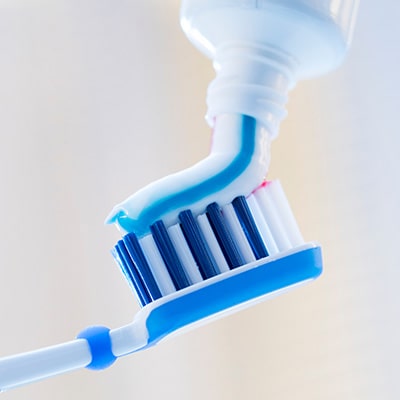Which toothpast to use?
Toothpaste is an essential part of maintaining oral health, but there is still a lack of awareness of its usefulness among patients.
Here's what you need to know and how to choose the right toothpaste for your individual situation.

What is toothpaste for?
Toothpaste alone does not clean your teeth.
It’s the mechanical action of the toothbrush, dental floss and interdental brushes that will remove plaque.
Toothpaste has loads of actions:
- Adds fluoride to the enamel
- Help dislodge plaque: reduces brushing time
- Remove stains (tea, coffee, tobacco…) thanks to small abrasive particles
- Give temporarily a fresh breath (menthol)
- Specific action: sensitive teeth, gum issues, …
Are you experiencing dental discomforts?
BOOK AN APPOINTMENTWhich toothpaste is right for me?
In all cases it is recommended to use fluoride-based toothpaste. Fluoride re-enforces the enamel and works to prevent cavities. Note that certain organic toothpastes do not contain fluoride.
Stay away from whitening toothpastes because they contain more abrasive particles to get rid of the stains, this wears the enamel. Worn enamel reflects less the light. With time your teeth will become dull. Best to see your dental surgeon more often for a scale and polish to get rid of the stains.
On top of a thorough check up, higher concentrated toothpaste (from the chemist) is recommended. Talk to your dental surgeon.
You can use desensitizing toothpaste. For it to be efficient, it must be used at least twice a day and not overly rinsed. You can, after the brushing, apply some on the more sensitive teeth with your finger and leave it on.
The colour of your teeth cannot be modified by using toothpaste. The whitening toothpaste only help to remove stains (tea, coffee, tobacco) but wears the enamel. To whiten your teeth, only a “bleaching” procedure performed by your dental surgeon will be efficient.
Special “gum health” toothpastes exist that you can use without risk. Nevertheless, gum disease (swelling, bleeding…) are caused by bacteria in dental plaque. The solution is to eliminate with a good brushing and regular prophylactic cleaning at the dentist.
Bad breath is very often due to dental issues. No toothpaste will eliminate the root cause. The smell of menthol will only last a few hours. Consult your dentist to look for the cause of bad breath.
It’s important to use a toothpaste adapted to the age of the child which contains an adapted amount of fluoride, and to only use a small amount.

How much toothpaste to use?
Only ever use a small amount of toothpaste:
- For adults and children over the age of 6, the equivalent of a green pea 2 to 3 times a day is sufficient for the entire mouth.
- For the child under 3: the equivalent of a grain of rice once a day is sufficient.
- For the child between 3 and 6 years of age: the equivalent of a grain of rice is recommended twice a day.

How to use toothpaste?
- Apply to the entire teeth surfaces.
- Then proceed to brush your teeth.
- Spit and rinse sparsely (even best not to rinse). Toothpaste must be in contact with the teeth surface to re-enforce the enamel and for the active ingredients to act (desensitizing, gum treatment…).
- If you are at risk of cavities, put a small amount of toothpaste on your interdental brushes to put fluoride in between the teeth.








